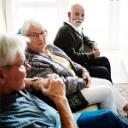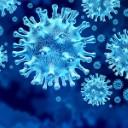-
May 29: The Week in Cancer News
A study shows that a more tolerable, dose-adjusted chemotherapy regimen can effectively treat a rare lymphoma, and data from registries provide information on which cancer patients are at greatest risk of death from COVID-19.
by Kate Yandell
-
Registries Report on COVID-19 and Cancer
Data shed light on risk factors for death among people with cancer infected with the coronavirus.
by Kate Yandell
-
May 22: The Week in Cancer News
A study finds that metastatic prostate cancer incidence rose after the U.S. Preventive Services Task Force urged against routine PSA testing, and the Food and Drug Administration approves two PARP inhibitors for treatment of prostate cancer.
by Kate Yandell
-
When COVID-19 Comes Home
I have brain cancer, and my wife is a health care worker. These are some questions we had to consider leading up to and after her diagnosis with COVID-19.
by Adam Hayden
-
May 15: The Week in Cancer News
A study indicates that children with cancer are not at increased risks of severe cases of COVID-19, and researchers find that Medicaid expansion was associated with reduced cancer deaths.
by Kate Yandell
-
What It’s Like to Get a “C” in Graduate School
I was afraid that my thyroid cancer diagnosis would derail my graduate school plans. Instead, it helped shape my career path.
by Carly Flumer
-
May 8: The Week in Cancer News
A study finds that opioid deaths have slightly increased among people with cancer, and the Food and Drug Administration approves a targeted therapy for non-small cell lung cancer.
by Kate Yandell
-
Embracing Palliative Care Sooner
Studies show the benefits palliative care can provide to advanced cancer patients, but also highlight inequities in access.
by Jen Tota McGivney
-
May 1: The Week in Cancer News
At the AACR Virtual Annual Meeting I, researchers presented new data on cancer biology, treatment, screening and risk reduction.
by Cancer Today Staff
Cancer Talk
Lessons From 20 Years Living With Cancer
Multiple myeloma survivor Jonathan Gluck reflects on uncertainty, and the scientific progress that has kept him living with cancer for more than two decades.
by Eric Fitzsimmons
The Enduring Importance of Cancer Disparities ResearchOpening session from AACR conference highlights how perseverance and adversity have informed cancer disparities research over the years.
by Eric Fitzsimmons
Most Cancer Survivors Don’t Meet Healthy Diet GoalsDespite research linking fruits and vegetables to cancer survival, many people do not change their eating habits after diagnosis.
by Darlene Dobkowski
Many People Don’t Get Colonoscopy After Receiving Abnormal Blood TestsAbout half of people who receive abnormal results from colorectal cancer screening tests don’t follow up with a colonoscopy.
by Laura Gesualdi Gilmore













